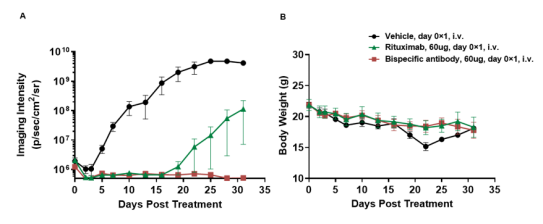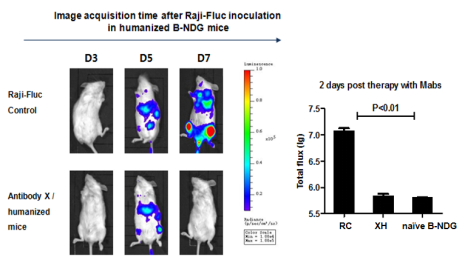Anti-tumor Efficacy Assessment of Monoclonal and Bispecific Antibodies in PBMC reconstituted B-NDG CDX model

B-NDG mice reconstituted with PBMCs were used for bispecific antibody efficacy studies.
Human B-luciferase-GFP Raji cells (5E5), PBMC (5E6) and antibody were intravenously injected into B-NDG mice (n=4). (A) fluorescence imager was used to monitor tumor fluorescence in mice. (B) Body weight changes during treatment. Administration of the bispecific antibody shows significant inhibitory effects. The results indicate that establishing a CDX tumor model in B-NDG mice with reconstituted PBMCs provide a powerful preclinical model for in vivo evaluation of antibody efficacy. Values are expressed as mean ± SEM.
Anti-CDX tumor efficacy study of antibody in B-NDG mice reconstituted with human CD34 + hematopoietic stem and progenitor cells

B-NDG mice reconstituted with CD34+ cells were used for drug efficacy studies.
Humanized B-NDG mice reconstituted with human CD34+ cells were i.v. injected with Human B-luciferase-GFP Raji cells (5E5). Mice were treated with a human PD-1 antibody 5 days after tumor cell implantation. A dramatic inhibitory effect of the human PD-1 mAb on tumor cell growth was observed at day 7. The results indicate that establishing a CDX tumor model in B-NDG mice with reconstituted CD34+ cells a powerful preclinical model for in vivo evaluation of anti-tumor antibodies. Values are expressed as mean ± SEM.
RC:Raji-Fluc Control. XH: Antibody X/humanized mice. naïve B-NDG: B-NDG mice without Raji-Fluc and antibody treatment.









